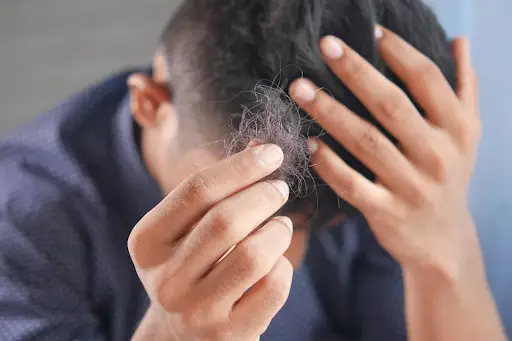Blog
Peptides for Hair Growth: The Science Behind Fuller, Thicker Hair

Peptides for hair growth are becoming a go-to option for people dealing with thinning hair, and not just in the biohacking world.
Whether it’s caused by aging, hormone shifts, stress, or inflammation, hair loss can feel frustrating and unfair. And while genes play a role, they’re not the whole story.
For years, the regular fixes were hit-or-miss: prescription drugs with side effects, expensive treatments, or hiding it with clever styling. Now, science is catching up, and peptides are one of the most exciting developments.
These small protein fragments act like small messengers in your body. They help repair tissue, calm inflammation, and boost circulation. Some even “wake up” dormant hair follicles.
That’s why more people are turning to topical and injectable peptides for hair growth as a gentler, more targeted alternative to harsh chemicals or surgery.
Peptides might be worth a closer look if your ponytail feels thinner or if you’re noticing more hair in the drain. Ready to learn more? In this blog, we go over everything you need to know about using peptides for hair growth.
What are peptides for hair growth?
Peptides are short chains of amino acids (the same building blocks that make up proteins). In your body, they send signals that tell cells what to do.
Some peptide therapies help with healing, others reduce inflammation, and a select few play a direct role in encouraging hair to grow.
Peptides for hair growth could influence growth factors involved in tissue repair and regeneration.
Some peptides may increase blood flow to the scalp, stimulate collagen production around the hair follicle, and promote the expression of genes in the hair growth cycle.
Hair-specific peptides work at the follicular level by supporting the anagen (growth) phase. They may wake up dormant follicles, extend the amount of time hair spends growing, and strengthen the surrounding tissue that supports each strand.
Peptides help your body do what it was already designed to do: just a little more efficiently.
Unlike harsh chemicals that try to force results, peptides work with your biology. This is one reason why they’re showing up more in functional medicine clinics and advanced skincare and haircare routines.
Whether delivered topically or through injectables, peptides for hair growth offer a smart, targeted approach to restoring fuller hair.
The best peptides for hair growth
Not all peptides are created equal, especially when it comes to hair. Some are better at improving circulation, while others support follicle repair or fight inflammation.
Here are four of the best peptides for hair growth, each with unique benefits that support healthier, thicker hair from the root up.
BPC-157: Healing and inflammation control
One of the most promising names in regenerative medicine, BPC-157 is a synthetic peptide originally derived from a protective protein found in the stomach.
BPC-157 is best known for speeding up wound healing and reducing inflammation. These are two key factors in scalp and follicle health.
When applied to hair loss, the BPC-157 hair growth benefits come from its ability to promote tissue repair around the follicles. It may also calm inflammation that may be stopping growth and improve local blood flow.
While most studies are animal-based, early evidence and anecdotal reports show potential for reviving dormant follicles and thickening existing hair.
GHK-Cu: The copper peptide powerhouse
GHK-Cu is a naturally occurring peptide bound to copper. It plays a big role in skin renewal, collagen production, and blood vessel formation.
In the context of hair, GHK-Cu helps increase oxygen and nutrient delivery to the follicles: two things essential for fast growth.
It’s also been shown to increase hair growth and thickness, enlarge follicle size, extend the growth phase, and reduce hair loss caused by inflammation or hormonal shifts.
This makes GHK-Cu a standout ingredient in many high-end hair serums and microneedling cocktails.
Thymosin Beta-4: Regeneration and scalp repair
Another healing peptide with powerful effects on tissue regeneration is Thymosin Beta-4.
This peptide may help restore a healthier environment for hair to grow again, especially for people dealing with hair loss linked to inflammation, scarring, or trauma (like from tight hairstyles or scalp injury).
Thymosin Beta-4 increases hair growth by encouraging the migration of stem cells to damaged areas and reducing fibrotic tissue buildup, an issue that can interfere with hair follicle health.
Melanotan II: Pigmentation support
While not a typical hair growth peptide, Melanotan II has a unique role worth mentioning. It stimulates melanogenesis, the process responsible for producing pigment in the skin and hair.
In some people, it’s been noted to enhance hair color or slow down graying by supporting natural melanin production.
This effect is still being studied and isn’t the main reason to use Melanotan II. But it’s an interesting side benefit for those exploring peptide stacks that target both growth and appearance.
Injectable vs. topical peptides for hair growth
The way you use peptides can make a big difference. Both injectable peptides for hair growth and topical solutions are popular, but they work in slightly different ways and offer varying benefits.
Injectable peptides: Deeper, more targeted results
Injectable peptides are usually delivered in two ways:
- Subcutaneous injections: Placed just under the skin near thinning areas
- Microneedling: Tiny needles create micro-channels in the scalp, and peptides are applied directly after
This method ensures the peptides bypass the skin barrier and get to work exactly where they’re needed: at the follicle level. It can lead to faster, more noticeable results, especially with peptides like BPC-157 and GHK-Cu.
However, injectables often require professional administration and may be slightly uncomfortable or carry minor risks like redness or swelling.
Topical peptides: Convenient and non-invasive
Topical peptide forms, like serums, sprays, and creams, are easy to use and widely available. Some clinics even combine peptides with PRP (platelet-rich plasma) treatments for advanced topical treatments.
These products are designed to penetrate your scalp and deliver active ingredients to the follicles, though absorption can vary.
The downside? Bioavailability is generally lower compared to injectables, meaning you might need consistent, long-term use to see results.
Which is better?
Injectable peptides for hair growth may offer better payoff if you’re looking for stronger, faster results and don’t mind a clinic visit. For those who prefer a gentler, DIY approach, topical peptides can still be effective; just give them time and stay consistent.
How peptides work to promote hair growth
Peptides don’t just hide the symptoms of hair loss; they target the root causes at the cellular level. By improving the scalp environment and helping follicles function more efficiently, peptides can restart or support your natural hair growth cycle.
Here’s how they work:
- They reduce inflammation: Chronic inflammation is one of the biggest hidden culprits behind hair loss. It can damage follicles and trigger early shedding. Peptides like BPC-157 and Thymosin Beta-4 help calm inflammatory pathways, making your scalp a friendlier place for hair to grow.
- They activate stem cells: Some peptides stimulate the stem cells around each follicle, especially where new hair formation begins. By “waking up” these cells, peptides support the regeneration of healthy follicles and the creation of new hair shafts.
- They improve blood flow (angiogenesis): Peptides like GHK-Cu promote angiogenesis, the formation of new blood vessels. Better blood flow means more oxygen and nutrients reach the hair follicles, giving them the fuel they need to stay in the anagen phase (the active growth stage of the hair cycle).
- They extend the growth cycle: Hair grows in cycles, and peptides help extend the anagen phase while delaying the shedding (telogen) phase. This means your hair has more time to grow longer and stronger before it naturally falls out.
- They support follicle repair: In cases of trauma, stress, or scalp conditions, peptides promote tissue repair around the follicles. This helps restore structure, reduce miniaturization (when follicles shrink), and prevent further loss.
Peptides take a more intelligent, biology-first approach to hair regrowth. Instead of forcing follicles to grow, they restore the conditions that allow your body to do it naturally.
What to expect: Timeline, results, and safety
Peptides work with your body, not against it, so results take time. Most people using peptides for hair growth begin to notice visible changes within 3–6 months, depending on the type of peptide, how it’s delivered, and the underlying cause of hair loss.
Here’s a general timeline:
- 4–8 weeks: Reduced shedding and improved scalp health
- 2–3 months: Early signs of new hair growth, improved thickness
- 4–6 months: Fuller density, better coverage, and stronger strands
Consistency is key. Regular application is what drives long-term success, whether you’re using injectable peptides for hair growth or topical formulas.
Are peptides safe?
Peptides are safe for most people, especially when used under medical guidance. Topical products are generally well-tolerated. Injections can cause minor side effects like redness, swelling, or irritation at the site. Rarely, allergic reactions may occur.
People with autoimmune conditions, active scalp infections, or who are pregnant or breastfeeding should consult a licensed provider before starting any peptide protocol.
It’s also smart to pair peptide use with scalp care, a balanced diet, and blood work to check for nutrient deficiencies.
Peptides aren’t an overnight fix, but with time and the right approach, they can offer a powerful, regenerative boost to your hair restoration journey.
Are peptides right for your hair loss?
Peptides for hair growth can be a great option if you catch hair loss early. They work best for people experiencing mild to moderate thinning, postpartum shedding, or hair loss linked to inflammation or stress.
If your scalp is still producing fine hairs (a sign that follicles are alive but struggling), peptides may help reverse the trend. They’re useful for addressing underlying issues like poor circulation, inflammation, or scalp sensitivity, all of which can sabotage healthy hair growth.
However, peptides aren’t a cure-all. If you’re dealing with scarring alopecia (where follicles are permanently damaged) or complete baldness in an area, they likely won’t regrow hair. In these cases, more intensive options like hair transplants may be needed.
Many experts recommend combining peptides with other treatments, like minoxidil, PRP, or targeted nutritional support, to maximize results. If you’re unsure where to start, a hair restoration specialist can build a plan based on your scalp condition, history, and goals.
The future of peptides in hair restoration
Peptides are reshaping how we think about hair loss. Instead of hiding the symptoms, they work with your biology to restore healthy growth from the inside out.
From BPC-157 hair growth support to copper peptides that boost follicle repair, this science-backed approach is gaining traction in both functional and aesthetic medicine.
As research evolves, we’re likely to see even more advanced peptide blends and delivery methods that make treatment easier, faster, and more personalized.
Peptides may be the future-friendly solution you’ve been waiting for if you’re looking for a smarter, more targeted way to tackle thinning hair. Explore advanced peptide hair growth solutions at LIVV Natural and take the first step toward stronger, fuller hair.


